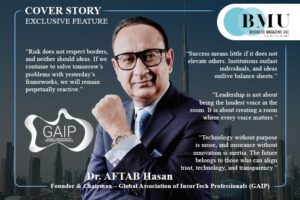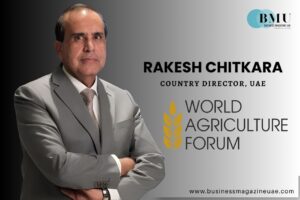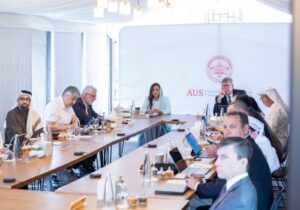
Few people have shaped the evolution of public sector HR in the Gulf as quietly — and profoundly — as Abdulrahman Alsheail. With nearly 20 years of experience spanning government, consulting, and academia, he has emerged as one of the most influential human capital minds driving national transformation agendas across Saudi Arabia and beyond.
Known for his precision, clarity, and systems thinking, Abdulrahman Alsheail has led multi-year transformation programs for ministries, designed national HR operating models, and advised public institutions on how to build future-ready workforce from within. But what sets him apart isn’t just his technical expertise — his enduring belief that transformation is only real when it’s human.
We spoke to Abdulrahman Alsheail about the pivotal moments that shaped his journey, the models he’s helped design, and the mindset shifts institutions must embrace to thrive in an era of seismic change.
A Curiosity That Became a Calling
We began by asking what first drew him to human capital — and how that early spark evolved into the work he does today.
“My career didn’t start with a job description or a destination. It started with a question: why do some public institutions thrive, while others — with the same policies, funding, or mandate — struggle to evolve?”
That question followed him from his early days in academia, where he focused on leadership development and competency frameworks, to advising national institutions navigating complex reform.
“As I moved from classroom instruction to large-scale advisory work, it became clear the differentiator wasn’t strategy alone — it was whether people were positioned and supported to deliver it.”
That realization pushed him beyond training programs into full-scale operating model design. “I wanted to build systems that wouldn’t just improve today’s performance but sustain tomorrow’s ambition.”
From Resistance to Ownership
One of the defining moments in Alsheail’s career came during the HR transformation of a major public entity under Vision 2030 realignment.
“At first glance, it looked like a structural redesign. But once inside, it became clear — this was about identity, belonging, and belief in a shared future.”
Instead of applying a top-down model, Abdulrahman Alsheail co-created a hybrid HR framework that offered consistency at the center while allowing flexibility across field operations.
“We designed a complete HR value chain — from workforce planning and skills frameworks to employee engagement and succession planning. But the real breakthrough wasn’t technical. It was cultural. People didn’t feel like change was happening to them. They felt like they were shaping it.”
That experience became a blueprint for future engagements: co-create, embed, and align emotionally.
When Strategy Meets Emotion
We asked him about a moment when a well-designed project stalled — and what he learned from it.
“There was a major engagement where everything checked out: the design was solid, systems were in place, and stakeholders signed off. But progress stalled. That’s when I realized that operational inclusion doesn’t guarantee emotional readiness.”
Rather than press forward, he paused. He formed task forces, gave employees true agency, and changed the narrative.
“It wasn’t about changing the plan. It was about changing the tone. Once people felt heard and involved, the energy shifted.”
Since then, Abdulrahman Alsheail has treated change management not as a phase but as the emotional architecture of transformation.
Technology as a Time Reclaimer
With AI reshaping every function — including HR — we asked how he sees the relationship between tech and talent.
“The most powerful use of AI in HR isn’t loud. It’s quiet. We introduced an AI-based assistant to manage administrative loads — things like data tracking, policy formatting, and scheduling. It wasn’t flashy. But the impact was immediate.”
Freed from routine tasks, HR teams began operating strategically — shifting from static reporting to real-time, insight-driven decisions. That shift freed up time for HR leaders to focus on workforce planning, capability building, and coaching — the work that actually drives transformation.
“People often fear AI will replace them. But here, it elevated them. It gave HR the space to become the strategic driver it was always meant to be.”
Insights from the Edges
We asked where his biggest ideas have come from. His answer was clear:
“Not from formal strategy meetings. Not from Power Points. Real insight lives at the edges — in hallway conversations, coaching moments, and feedback loops.”
In one public organization, managers repeatedly voiced frustration over a rigid promotion system. Alsheail noticed the pattern and responded.
“We didn’t just tweak the system. We replaced it. We built a skills-based mobility model based on readiness, not tenure. It created transparency and restored trust.”
For Abdulrahman Alsheail, discomfort is data, and proximity is power.
Consulting in a New Era
On the evolution of consulting in Saudi Arabia, Alsheail is direct:
“Saudi Arabia is no longer just a client market — it’s a transformation lab. Institutions aren’t asking for best practices in theory. They want what works in their governance structure, legal framework, and culture.”
This shift has reshaped the role of consultants. The era of distant frameworks is over. Institutions demand embedded, agile, outcome-driven advisory.
“To thrive, consultants need to move beyond insight delivery. They must transfer capability, understand institutional nuance, and build trust. You can’t consult from the sidelines. You need to be inside the system.”
Building Strength That Outlasts You
We asked how he sees the future of advisory work in national development.
“Consulting used to be about bringing in expertise. Now, it’s about enabling ownership. If I walk away and the system collapses, I’ve failed.”
In Saudi Arabia, he notes, advisory work is now directly tied to delivering Vision 2030 — not just in concept but in execution.
“Every HR model we design is built to be self-sustaining. The goal isn’t to stay — it’s to leave behind a stronger institution.”
A Leadership Philosophy Without the Noise
How has his leadership approach evolved?
“When I started, I thought leadership meant having answers. Now, I see it as creating space for others to find theirs.”
Abdulrahman Alsheail describes his style as clear, calm, and intentional — a steadying presence in complex reform environments.
“In times of ambiguity, people don’t need volume. They need perspective. That’s what I try to bring to every table.”
Re framing Setbacks as Design Moments
Transformation is rarely linear. We asked about a moment when delay led to unexpected clarity.
“One project was paused due to internal politics. At first, it felt like a failure. But the pause gave us space to listen more deeply — not just to leadership, but to those inside the system.”
What emerged wasn’t a new plan — but a new foundation.
“People didn’t want just a better system. They wanted to shape it. So we brought them in, reframed the approach, and the project returned stronger than before.”
Shifting the Mindset
What if he could shift one mindset in public institutions?
“From compliance to commitment. Too much of HR is designed to prevent mistakes, not promote excellence.”
He envisions a future where performance systems measure growth, not just output — and where development is driven by aspiration, not assignment.
“That’s the HR I want to build — one that inspires people to rise, not just to stay in line.”
Looking Ahead
Abdulrahman Alsheail continues to lead transformation initiatives while mentoring future HR leaders across the region. His focus remains clear: building systems that don’t just react to change but anticipate it.
“The future of public institutions won’t be defined by how fast they digitize. It will be defined by how deeply they believe in people — and how intentionally they design for them.”
Connect with Abdulrahman Alsheail on LinkedIn
Also Read :-
Building Successful Restaurants With Zeora Hospitality: Gergely Szabo and Mark Towning
Abraam Samy’s Journey From A Seasoned Marketing Expert To Entrepreneur








